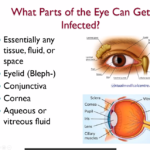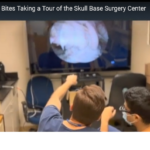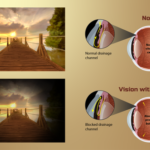The Eye & Ear Foundation’s June 3rd webinar covered a topic that affects an estimated 50 million Americans. “Living with Tinnitus: Clinical Evaluation and Management Strategies” was presented by Lori Zitelli, Au.D., CH-TM, Managing Audiologist, UPMC Center for Audiology and Adjunct Instructor of Audiology at the University of Pittsburgh School of Health & Rehabilitation Sciences. […]
What Makes a Good Surgeon?
Becoming a good surgeon is not just about graduating from medical school or making it through residency. Carl Snyderman, MD, MBA, Otolaryngology Director of the UPMC Center for Cranial Base Surgery, discussed what it entails in the May 2 Eye & Ear Foundation webinar, “What Makes a Good Surgeon? Advances in Surgical Training.” Training The […]
Optic Neuropathies
Can Kocasarac, MD, has a unique role. As part of the Neuro-Ophthalmology Service at the UPMC Eye Center – which he joined this last year — the Clinical Assistant Professor of Ophthalmology at the University of Pittsburgh specializes in vison issues related to the nervous system. His April 20th webinar, hosted by the Eye & […]
Breathing Easier
To begin his presentation for the April 7th Eye & Ear Foundation webinar entitled, “Breathing Easier: Sinonasal and Allergies,” Mikhaylo Szczupak, MD, shared an iconic image of Pittsburgh with one of its many bridges framed by cherry blossoms. “This is an image of what many probably imagine when you think of this wonderful city during […]
Refractive Surgery
The UPMC Eye Center has a long history of doing refractive surgery. In fact, it was part of a pivotal FDA trial that resulted in LASIK approval – back in 1995. “The UPMC Eye Center is the oldest continuously running refractive surgery center,” said Deepinder K. Dhaliwal, MD, LAc, Professor of Ophthalmology at the University […]
Hearing with the Brain
“Hearing with the Brain,” the topic of the Eye & Ear Foundation’s March 10th webinar, discussed hearing loss and research being done on cochlear implants. Prevalence of Hearing Loss “Hearing loss is an incredibly common problem,” said Andrew McCall, MD, FACS, Associate Professor of Otolaryngology at the University of Pittsburgh School of Medicine. In 2011, […]
Understanding Common Eye Infections

The University of Pittsburgh has the unique privilege of having an ophthalmic microbiology laboratory. There are not too many around nationally, according to Dr. Alex Mammen, MD, Clinical Assistant Professor of Ophthalmology, Cornea, Cataract, External Disease, and Refractive Surgery at the University of Pittsburgh and medical director of the UPMC Charles T. Campbell Ophthalmic Microbiology […]
Everything You Need to Know About Hearing Aids
If you have a question about hearing aids, it was likely answered in the Eye & Ear Foundation’s February 9 webinar. Catherine Palmer, PhD, CCC-A, Professor in the Department of Communication Science & Disorders and Professor in the Department of Otolaryngology at the University of Pittsburgh, and Director of Audiology for the UPMC Integrated Health […]
Read More… from Everything You Need to Know About Hearing Aids
Corneal Transplantation
If you are an organ donor, there is a chance your corneas could be part of a life changing operation. The Eye & Ear Foundation’s January 28 webinar, “Corneal Transplantation: From Donor to Recipient,” took viewers through the process. Criteria for Donation Janice Anderson, Ocular Customer Service Specialist with the Center for Organ Recovery and […]
Pittsburgh Skull Base Surgery Center Tour

On Monday, January 10, Eye & Ear Foundation webinar attendees got a tour of the University of Pittsburgh Skull Base Surgery Center from the comfort of their homes and offices. Doctors Carl Snyderman (Professor of Otolaryngology, Otolaryngology Co-Director of the Center for Cranial Base Surgery) and Paul Gardner (Peter J. Jannetta Endowed Chair in Neurosurgery, […]
Functional Vision Loss
According to the World Health Organization, 2.2 billion people worldwide have a visual impairment. William Smith, DO, Assistant Professor of Ophthalmology at the University of Pittsburgh School of Medicine, projects that all these individuals have some level of functional vision loss. The prevalence is expected to double over the next 30 years due to an […]
Improving Eye Care Delivery

Focusing on patient education, patient preferences, and system-based changes to broaden eye care delivery is Dr. Andrew Williams’ passion. The Assistant Professor of Ophthalmology at the University of Pittsburgh talked about “Patient and Community Engagement to Improve Eyecare Delivery in Glaucoma and Other Chronic Eye Diseases” in The Eye & Ear Foundation’s December 17th webinar. […]
Understanding and Treating Swallowing Disorders
So much of our society is centered around food and drink. But swallowing issues can prevent some people from participating and enjoying this important life activity. In The Eye & Ear Foundation’s December 1 webinar, “The Why and the How Behind Treating Swallowing Disorders,” Tamara Wasserman-Wincko, MS, CCC-SLP, discussed the causes of dysphagia, or difficulty […]
Read More… from Understanding and Treating Swallowing Disorders
Imaging for Retinal Diseases
You know how people say, “You had to be there?” That is the case with The Eye & Ear Foundation’s November 19 webinar, “Imaging for Retinal Diseases.” It is one thing to describe the different imaging modalities. It is far more effective, however, to do this by showing what each detects. The good news is […]
Removing Salivary Stones
Think of it like a kidney stone, but in your mouth. When material builds up over time, the salt in the saliva glands calcify and form a stone in the glands of the mouth called a salivary stone. Or, if you want to be fancy, the medical term is sialolith. When it blocks the salivary […]